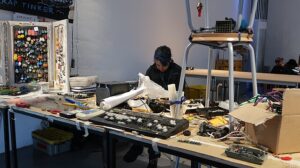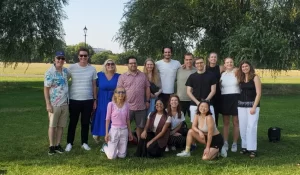Last week we held our Jump Insight Seminar at the Royal Geographical Society in London for a series of brilliant presentations around the theme of ‘Engaging People in Net Zero’. As this was our first in person event since 2019, it was great to have the Jump community together to exchange ideas and best practise on the ever-changing topic of sustainability. We were pleased to host speakers from the public, private and third sectors, who each shared some key learnings on the best strategies for engagement, and this blog will give an overview of the knowledge shared.
Jennifer Strong – Manchester University NHS Foundation Trust
In her presentation titled ‘The never-ending journey: sustainability engagement’, Jennifer detailed her learnings heading sustainability at the largest NHS Trust in the country and the importance of not trying to work against the workplace culture. Many trusts are made of different hospitals, each with its own culture, and there is a great opportunity here if you can find ways to harness that culture rather than trying to impose strategies that have worked well in other contexts. Jenn also emphasised that engagement is a never-ending process, so your sustainability strategy must have scalability. You can then channel people through a series of engagement tactics:
- This starts with ensuring that people understand the broader issues and an appreciation that sustainability is a priority for the organisation. Then helping them to make small changes to their behaviours and showing them the impact this has.
- These people then form a network of sustainability advocates or champions within the organisation and provide the opportunity to start doing more events and projects on the ground on a larger scale. This network can then be utilised to bring more people on board.
Will Masefield – Gloucestershire Wildlife Trust
In his presentation titled ‘Inspiring Action for Nature’, Will explained how the Trust aims to make conservation as normalised as recycling, and he presented his key takeaways from his resident engagement programme WilderGlos:
- Educating people on the broader benefits of conservation is essential for giving people a reason to engage beyond it being the right thing to do. If we normalise natural solutions like tree planting and establishing wetlands, it can significantly impact communities at risk of flooding.
- Will also discussed the importance of communicating economies of scale when encouraging people. The Trust recently created a ‘People’s Nature Reserve’ asking residents to pledge a piece of their garden or a window box to be left to grow wild. They then mapped the accumulative area (over 9,000 square meters so far!), this shows people that their relatively small actions make a big difference.
Eleanor Whitford-Kelly – Endsleigh Insurance
From Endsleigh Insurance, an insurance company that specialises in student markets, we had Eleanor Whitford-Kelly. In her presentation titled ‘defining a path to a sustainable future’, Eleanor explained that Endsleigh Insurance is relatively new to its sustainability journey. They recently created a Corporate Social Responsibility Committee, which led to the following discoveries:
- One of the key things they found was that it is not essential to have everything in place before you start talking to your people about sustainability. There is never a perfect time, and there will always be competing priorities, but as more people get involved more ideas will be uncovered and implemented.
- It is essential to make CSR and sustainability more than just data, reporting, and box-ticking. Endsleigh Insurance are determined to ensure that they make sustainability a part of the culture. They are keen to create a community of employees who share tips and ideas and take ownership of their sustainability progress.
Hope Carpenter and Cassidy Travis – Lambeth Borough Council
Our speakers from Lambeth Borough Council, Hope Carpenter and Cassidy Travis presented the importance of removing barriers when trying to engage people with sustainability. This was titled ‘From intention to action: Lambeth Council’s approach to empowering climate action’; some key takeaways from the presentation are:
- At Lambeth, they have identified that around 60% of action relies on behaviour change, whether that is recycling, insulation, or a whole spectrum in between. Therefore, they must invest in removing the barriers to sustainability for both their staff and residents.
- Cassidy explained that perceived unfairness in the distribution of responsibility and impact can be a real turn off for engagement. Therefore, Lambeth is approaching their ‘empowering climate action’ goal with a strong focus on climate justice. When helping facilitate change, they are attempting to prioritise those who are the least responsible and the least able to respond, whilst pushing those with the most capacity and responsibility to make more significant changes, faster.
- They also covered the language around sustainability. Which they found sometimes creates a barrier to engagement. For example, many people don’t understand all the ‘sustainability jargon’, which can make them feel removed from the issues. They explained that it could be helpful to frame things in terms of cost savings or not pushing decarbonisation and biodiversity but focusing on clean air and safe green spaces within communities.
Charmaine Morrell – Nottingham Trent University
In her presentation titled ‘Nottingham Green Rewards, ’ Charmaine explained how important it is to look at the big and small picture when thinking about how to engage people. Some key takeaways from Charmaine’s presentation are:
- NTU are front runners in university sustainability league tables, and they also make sure to collaborate with other Nottingham based organisations to increase their impact and create a culture of sustainability in the region. These organisations include the University of Nottingham and the network of local Nottingham Councils. The partnership allows them to complement each other’s work, rather than compete against each other, and has led to a collaborative culture in the city that prevails even without NTU’s direct involvement, such as the Nottinghamshire councils collaborating to reduce bus prices.
- Students are a hard group to engage as there are so many demands on their time, NTU is constantly innovating to find the most effective ways of driving engagement. This September they are planning to capitalise on ‘student influencers’ to help them reach larger networks of their student base.
Laura Middlemass – Newcastle upon Tyne Hospitals NHS Foundation Trust
From Newcastle upon Tyne Hospitals NHS Foundation Trust, Laura’s presentation focused on the importance of employers removing as many barriers as possible for employees to engage in sustainable behaviours. Some key takings from her presentation were:
- Asking your people what prevents them from getting involved in sustainability is the best place to start when developing your strategy.
- She spoke on the importance of ensuring that your sustainability strategy evolves with your organisation, especially as the role of digital technologies in sustainability grows; we should always be continuing to push for progress.
- People only have so much capacity and resources- these must be used to the greatest effect. As sustainability officers, it is important to channel your champion’s energy into projects with the most significant impact with the least resource. There are many good ideas, but only so many hours a day!
Overall, the event was a valuable opportunity to get together, share best practice and ideas, and gain inspiration to develop our sustainability strategies. A special thanks to all of our speakers for giving us an insight into their organisation’s and for creating interesting topics of conversation. If you are interested in knowing more about engaging your people in sustainability, book a meeting with one of our engagement experts today.






